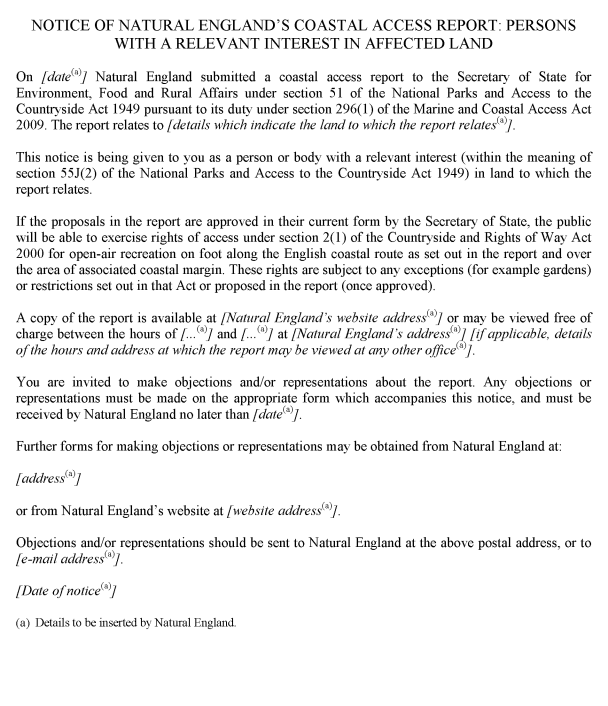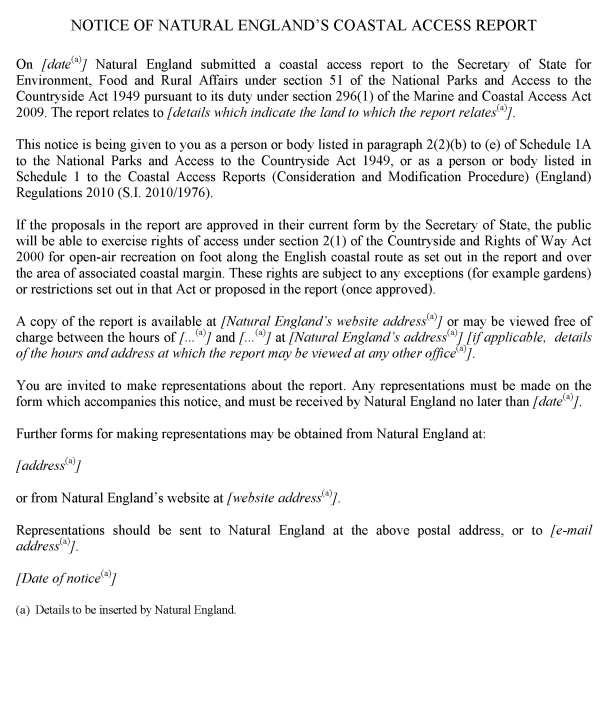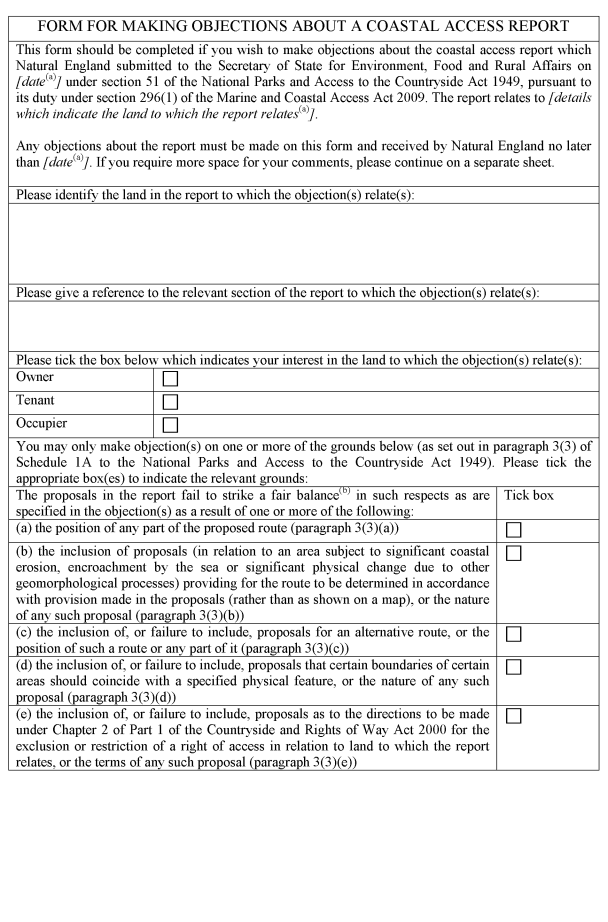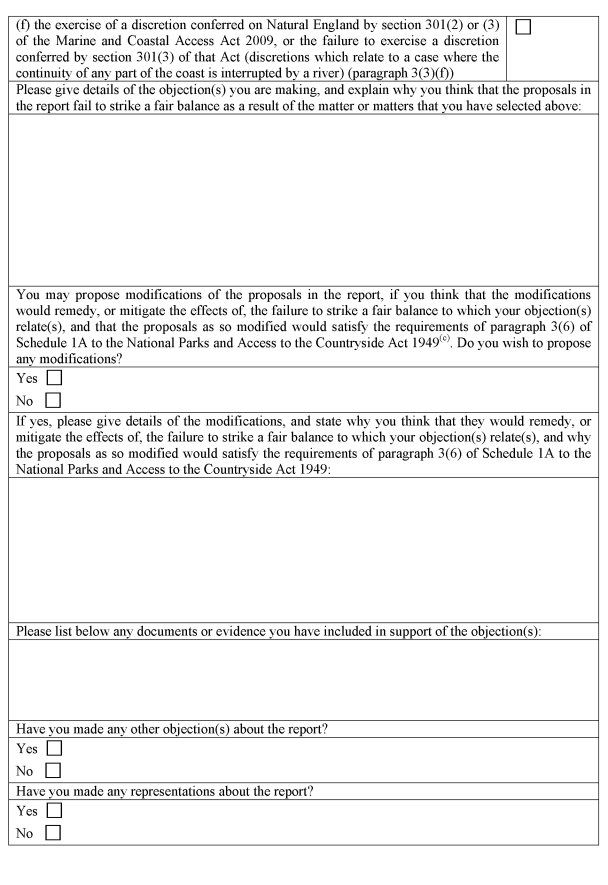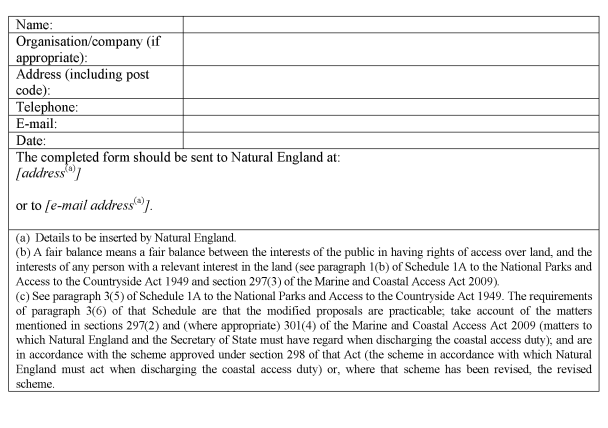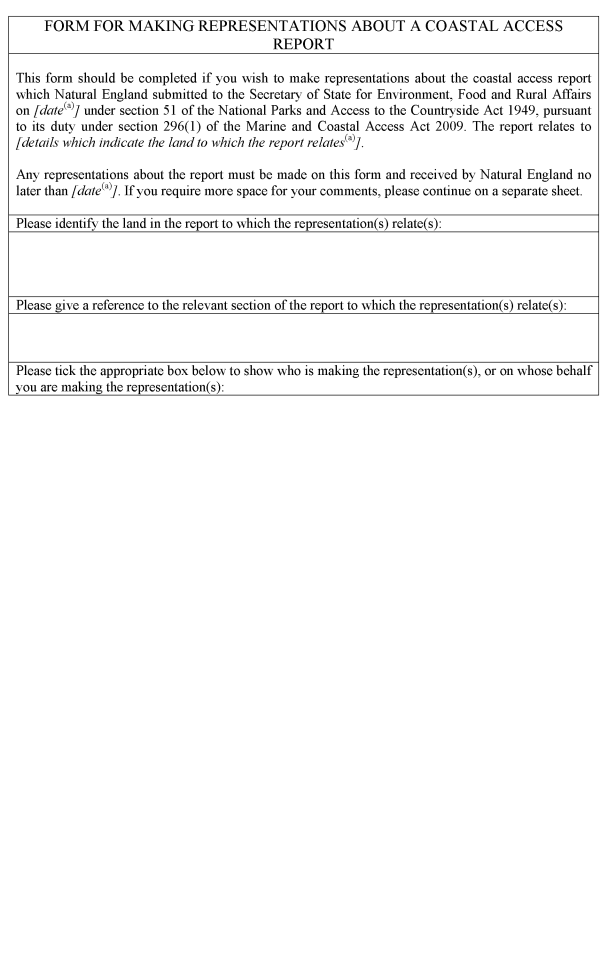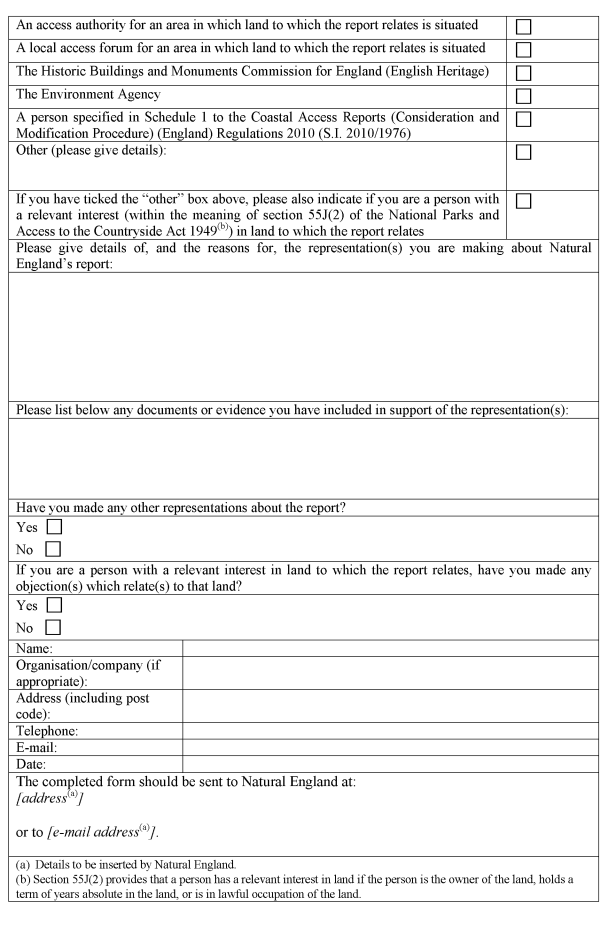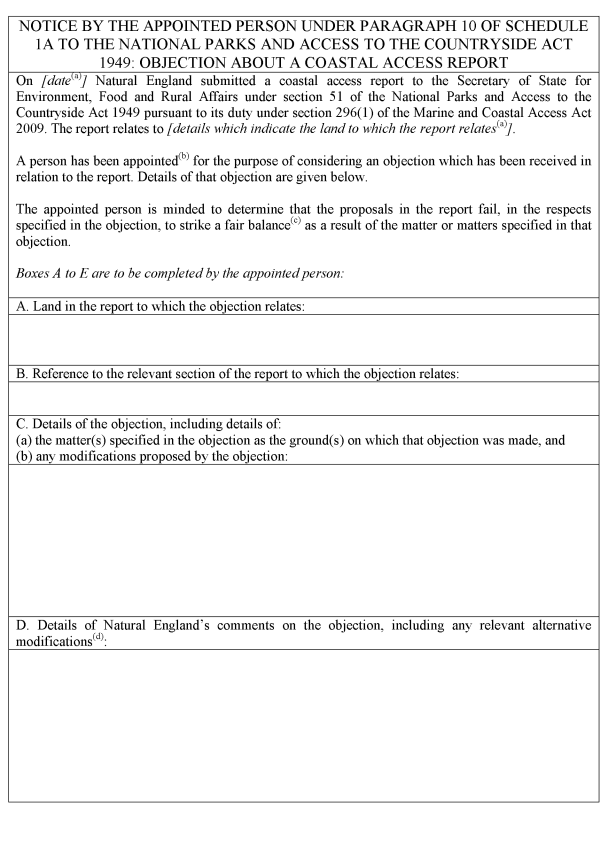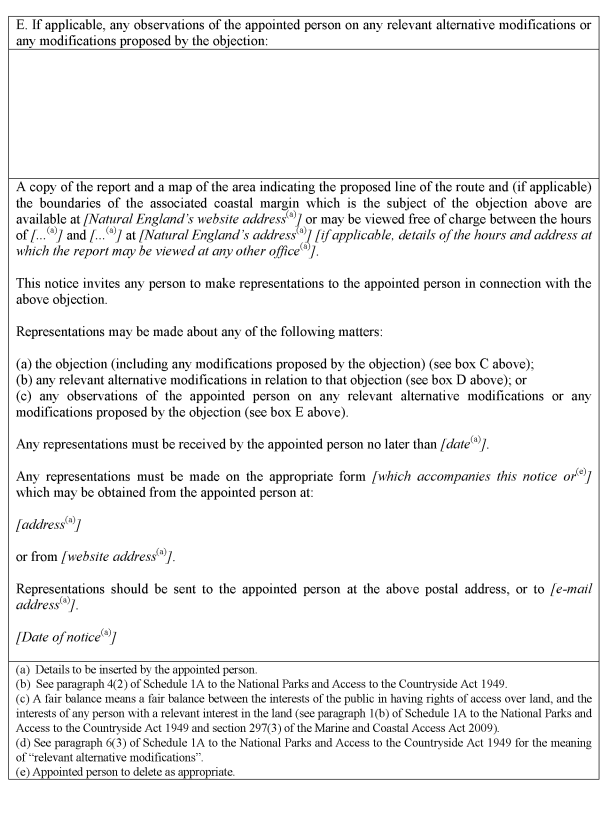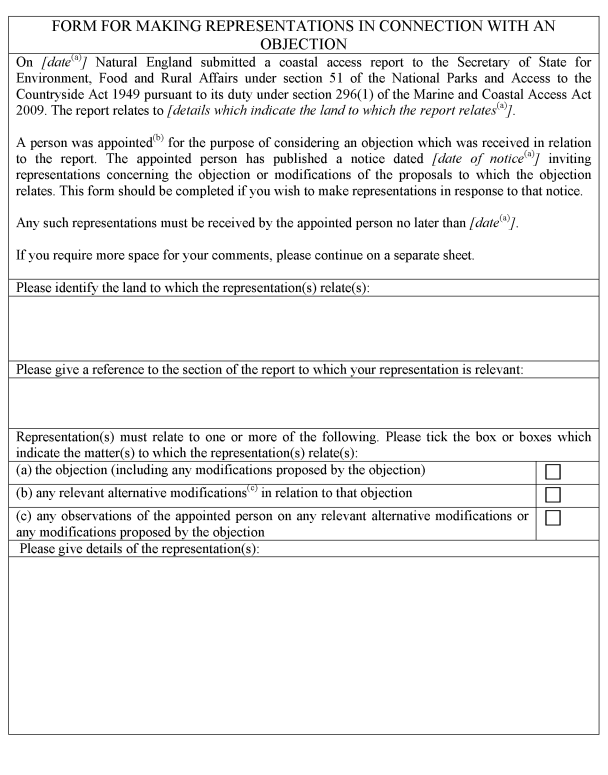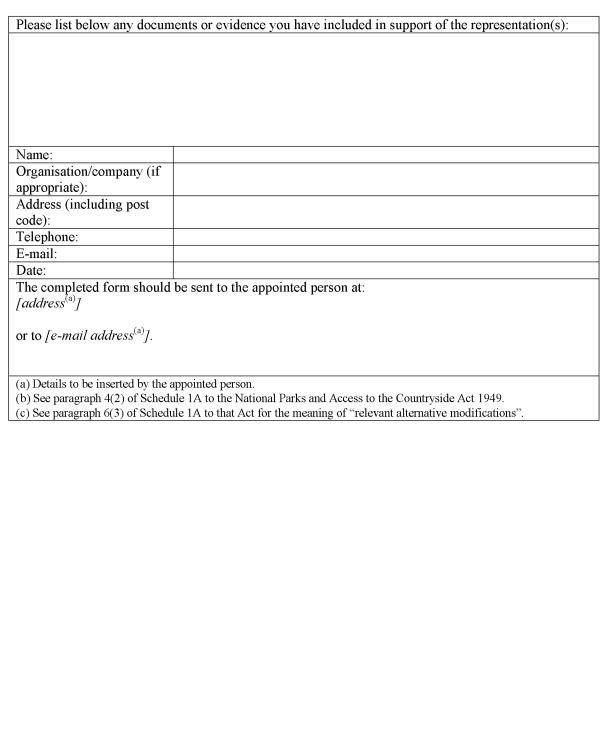The Coastal Access Reports (Consideration and Modification Procedure) (England) Regulations 2010
Laid before Parliament
11th August 2010
Coming into force
1st October 2010
Go to Explanatory Note
The Secretary of State makes the following Regulations in exercise of the powers conferred by section 55J(3) of, and paragraphs 2(2)(f) and (3), 3(7), 7(2), 10(6), 14, 15(1) and 16(4) and (6) of Schedule 1A to, the National Parks and Access to the Countryside Act 1949().
PART 1
INTRODUCTORY PROVISIONS
Citation, commencement and interpretation
1.–(1) These Regulations may be cited as the Coastal Access Reports (Consideration and Modification Procedure) (England) Regulations 2010 and come into force on 1st October 2010.
(2) In these Regulations–
"the 1949 Act" means the National Parks and Access to the Countryside Act 1949();
"AP" means the appointed person;
"electronic communication" has the meaning given in section 15(1) of the Electronic Communications Act 2000();
"objection" means an objection about a report made under paragraph 3(1) of the Reports Schedule, and, in Part 5 (hearings and local inquiries), means the objection or objections to be considered at the hearing or inquiry in question;
"other interested persons" means persons specified–
(a)
in any of paragraphs (b) to (e) of paragraph 2(2) of the Reports Schedule, or
(b)
in Schedule 1 (persons specified for the purposes of paragraph 2(2)(f) of the Reports Schedule);
"relevant land" means that part of the affected land to which a particular objection relates, and includes any land which is the subject of a modification proposed by the objection;
"report" means a coastal access report;
"the Reports Schedule" means Schedule 1A to the 1949 Act;
"submission date" means the date on which a report was submitted to the Secretary of State under section 51 of the 1949 Act (general provisions as to long-distance routes).
PART 2
CONSULTATION BY NATURAL ENGLAND
Advertisement relating to a report
2.–(1) Natural England´s duty to advertise a report (under paragraph 2(1)(a) of the Reports Schedule) must be performed on, or as soon as reasonably practicable after, the submission date of that report.
(2) Natural England must advertise a report–
(a)
in one or more local or regional newspapers circulating in the area to which that report relates;
(b)
on Natural England´s website; and
(c)
in any other manner that Natural England thinks appropriate for drawing the attention of members of the public to the report.
(3) An advertisement relating to a report must enable the report and its subject-matter to be identified, and for that purpose must include the following–
(a)
the report´s submission date;
(b)
details of the land to which the report relates;
(c)
details of the nature of the proposed public rights of access over that land; and
(d)
details of where the report may be viewed or inspected.
(4) An advertisement relating to a report must–
(a)
invite representations about the report under paragraph 7(1) of the Reports Schedule;
(b)
specify that such representations must be made in accordance with the applicable requirements of regulation 4 (objections and representations about a report);
(c)
specify that a form for making such representations may be obtained from Natural England; and
(d)
specify Natural England´s postal address and address for receiving an electronic communication.
Notice of a report by Natural England
3.–(1) Schedule 1 specifies persons for the purposes of paragraph 2(2)(f) of the Reports Schedule.
(2) Natural England´s duty (under paragraph 2(1)(b) of the Reports Schedule) to take such steps as are reasonable to give notice of a report must be performed on, or as soon as reasonably practicable after, the submission date of that report.
(3) Such a notice to persons with a relevant interest() in affected land–
(a)
must be in the form set out in Schedule 2; and
(b)
must be accompanied by the forms set out–
(i)
in Schedule 4, and
(ii)
in Schedule 5.
(4) Such a notice to other interested persons–
(a)
must be in the form set out in Schedule 3; and
(b)
must be accompanied by the form set out in Schedule 5.
Objections and representations about a report
4.–(1) Objections and representations must be made in writing to Natural England.
(2) Objections must be made on the form set out in Schedule 4.
(3) Representations must be made on the form set out in Schedule 5.
(4) Any objections or representations made about a report must be received by Natural England within the period of eight weeks beginning with the date on which that report was first advertised on Natural England´s website.
(5) A person who has made an objection or a representation may withdraw that objection or representation at any time by giving notice in writing to Natural England.
(6) In this regulation "representation" means a representation about a report made under paragraph 7(1) of the Reports Schedule.
PART 3
APPOINTED PERSON´S FUNCTIONS
Notice by the appointed person under paragraph 10 of the Reports Schedule
5.–(1) AP´s duties to publish a notice (under paragraph 10(4) of the Reports Schedule) and give a copy of that notice to certain persons (under paragraph 10(5) of that Schedule) must be performed as soon as is reasonably practicable after AP reaches the decision that AP is minded to determine that the proposals in a report fail to strike a fair balance (see paragraph 10(3) of that Schedule).
(2) A notice must be in the form set out in Schedule 6.
(3) AP must publish a notice–
(a)
in one or more local or regional newspapers circulating in the area to which the relevant report relates;
(b)
on AP´s website; and
(c)
in any other manner that AP thinks appropriate for drawing the attention of members of the public to the notice.
(4) A copy of a notice which is given to any person must be accompanied by the form set out in Schedule 7.
(5) In this regulation and in regulation 6, "notice" means a notice under paragraph 10 of the Reports Schedule.
(6) In paragraph (3) "the relevant report" means the report to which the notice in question relates.
Representations in response to an invitation in a notice under paragraph 10 of the Reports Schedule
6.–(1) Representations made in response to an invitation in a notice must be made–
(a)
in writing to AP; and
(b)
on the form set out in Schedule 7.
(2) Any representations made in response to an invitation in a notice must be received by AP within the period of eight weeks beginning with the date on which that notice was first published on AP´s website.
Further information to be provided to the appointed person
7.–(1) AP may give a notice to any person who has made an objection requiring that person to provide AP, within a period of time specified in the notice, with information or documents–
(a)
which is or are in that person´s possession; and
(b)
which AP reasonably requires for the purpose of considering that objection.
(2) A person receiving such a notice must provide the information or documents within the specified period.
(3) AP may consider and determine an objection in the absence of any information or documents which were required to be provided under this regulation but were not so provided.
Inspection of land (where hearing or inquiry is not to be held)
8.–(1) This regulation applies where AP is considering an objection otherwise than by means of holding a hearing or inquiry.
(2) AP may carry out a site inspection of the land to which the objection relates, provided that–
(a)
AP has invited Natural England and the person or persons who made the objection to be present or be represented at the inspection; and
(b)
AP has given any person who is to be present at the inspection reasonable notice of the date and time of the inspection.
(3) AP may be accompanied at the inspection by any other person AP thinks appropriate.
(4) The inspection does not need to be deferred if a person to whom notice of the inspection was given is not present at the appointed time of the inspection.
Consideration of two or more objections together
9. AP may consider two or more objections together where–
(a)
the objections relate to the same area of affected land;
(b)
the objections relate to adjacent or contiguous areas of affected land;
(c)
the objections relate to the same issue or ground and AP thinks that the circumstances in which they arise are sufficiently similar to warrant the objections being considered together; or
(d)
AP otherwise thinks that it would be expedient to consider the objections together.
PART 4
SECRETARY OF STATE´S PROPOSALS FOR MODIFICATIONS
Consultation by the Secretary of State on possible modifications
10.–(1) This regulation applies where, as contemplated in paragraph 15(1)(b) of the Reports Schedule, the Secretary of State wishes to consult persons for the purposes of identifying or investigating a possible modification of the proposals in a report (a "possible modification").
(2) The Secretary of State must consult–
(a)
in all cases–
(i)
Natural England,
(ii)
any person with a relevant interest in land which is not affected land() but would be such land if the possible modification were made to the proposals, and
(iii)
any person with a relevant interest in affected land whom the Secretary of State thinks it appropriate to consult; and
(b)
where any person has made an objection in connection with which the Secretary of State wishes to identify or investigate the possible modification–
(i)
that person, and
(ii)
any other person with a relevant interest in relevant land.
(3) For the purpose of determining whether land would be affected land for the purposes of paragraph (2)(a)(ii), in section 55J(1) of the 1949 Act–
(a)
in paragraph (a) of the definition of "affected land" and paragraph (a) of the definition of "relevant coastal margin", "the proposals" is taken to mean the proposals as modified by the possible modification;
(b)
and, accordingly, the words "(without modifications)" in paragraph (a) of the definition of "relevant coastal margin" are taken to be omitted.
Procedure where the Secretary of State is minded to approve proposals with a relevant modification
11.–(1) This regulation applies where the Secretary of State is minded, as contemplated in paragraph 16(4) of the Reports Schedule, to approve proposals with a relevant modification.
(2) In this regulation a "relevant modification" means a modification other than a modification made in accordance with a recommendation under paragraph 11(7)(b) or (c) or (8)(a) or (b) of that Schedule.
(3) Where this regulation applies, the following provisions apply with the modifications specified in paragraphs (4) to (7)–
(a)
the following provisions of the Reports Schedule–
(i)
paragraph 1,
(ii)
paragraph 2(1) and (2),
(iii)
paragraph 3(1) to (6),
(iv)
paragraph 4,
(v)
paragraph 5,
(vi)
paragraph 6(1), (2)(a), (b) and (d) and (3),
(vii)
paragraph 7(1),
(viii)
paragraph 8,
(ix)
paragraph 9,
(x)
paragraph 10(1) to (5) and (7),
(xi)
paragraph 11,
(xii)
paragraph 12,
(xiii)
paragraph 13,
(xiv)
paragraph 16(1) and (3), and
(xv)
paragraph 18; and
(b)
the provisions of these Regulations, except regulation 10 (consultation by the Secretary of State on possible modifications) and this regulation.
(4) Any reference in a provision specified in paragraph (3) to proposals in a coastal access report (however expressed) is taken to mean those proposals as modified by the relevant modification, but limited to those parts of the proposals–
(a)
so modified, or
(b)
affected by that modification.
(5) For the purposes of paragraph (4)–
(a)
any reference to a coastal access report (however expressed) is taken to be a reference to the proposals in that report; and
(b)
a part of the proposals is taken to be affected by the relevant modification if that modification affects the question of whether a fair balance is struck in respect of that part.
(6) For the purposes of the construction of any reference to "affected land", in section 55J(1)() of the 1949 Act–
(a)
in paragraph (a) of the definition of "affected land" and paragraph (a) of the definition of "relevant coastal margin", "the proposals" is taken to mean the proposals as modified by the relevant modification;
(b)
and, accordingly, the words "(without modifications)" in paragraph (a) of the definition of "relevant coastal margin" are taken to be omitted.
(7) Any reference in a provision specified in paragraph (3) to any other such provision is taken to be a reference to that other provision as applied by that paragraph.
PART 5
HEARINGS AND LOCAL INQUIRIES
Application and interpretation of Part 5
Application and interpretation of Part 5
12.–(1) This Part applies where AP decides to hold a hearing or a local inquiry in connection with the consideration of an objection.
(2) In this Part "representation" means a representation–
(a)
under paragraph 7(1) of the Reports Schedule, or
(b)
in response to an invitation in a notice under paragraph 10 of that Schedule,
which is made in accordance with the applicable requirements of regulation 4 (objections and representations about a report) or 6 (representations in response to an invitation in a notice under paragraph 10 of the Reports Schedule) (as the case may be).
Hearings and inquiries: common provisions
Notice of the hearing or inquiry
13.–(1) As soon as possible after the decision to hold a hearing or inquiry, AP must–
(a)
publish notice of the hearing or inquiry in accordance with paragraph (2); and
(b)
give notice of the hearing or inquiry to the persons specified in paragraph (3).
(2) The notice must be published–
(a)
in one or more local or regional newspapers circulating in the area to which the relevant report relates;
(b)
on AP´s website; and
(c)
in any other manner that AP thinks appropriate for drawing the attention of members of the public to the notice.
(3) The notice must be given to–
(a)
Natural England;
(b)
the access authority for the area in which relevant land is situated;
(c)
the person or persons who made the objection;
(d)
any other person with a relevant interest in relevant land; and
(e)
any person who has made representations relevant to–
(i)
the objection,
(ii)
a modification of the proposals proposed by the objection, or
(iii)
a relevant alternative modification contained in Natural England´s comments on the objection.
(4) The notice of the hearing or inquiry must–
(a)
specify its date of issue;
(b)
state that AP intends to determine the objection by way of a hearing or inquiry;
(c)
state the date, time and place of the hearing or inquiry;
(d)
give details of the place and times at which documents relating to the hearing or inquiry may be available for inspection; and
(e)
give a brief description of–
(i)
the relevant report,
(ii)
the relevant land, and
(iii)
the objection.
(5) The date fixed for the hearing or inquiry must be not less than six weeks after the date of first publication of the notice of hearing or inquiry on AP´s website.
(6) Subject to paragraph (5), AP may change the date, time or place of the hearing or inquiry, provided that AP gives reasonable notice of the change to those persons to whom notice of the hearing or inquiry was originally given under paragraph (3).
(7) AP is not required to give notice of an adjourned hearing or inquiry if the date, time and place of the adjourned hearing or inquiry are announced at the hearing or inquiry before its adjournment.
(8) In this regulation "the relevant report" means the report to which the objection relates.
Appearances at the hearing or inquiry
14.–(1) Any person to whom notice must be given under paragraph (3) of regulation 13 (notice of the hearing or inquiry) is entitled to appear at the hearing or inquiry.
(2) Any other person may appear at the hearing or inquiry if AP so permits.
(3) Any person appearing at the hearing or inquiry may appear in person or be represented by any other person.
Procedure at the hearing or inquiry
15.–(1) AP is to determine the procedure at the hearing or inquiry.
(2) At the start of the hearing or inquiry, AP must–
(a)
confirm AP´s appointment;
(b)
state AP´s name; and
(c)
identify the following–
(i)
the issues which AP thinks are the main issues to be considered, and
(ii)
any matters on which AP requires further explanation from any person appearing at the hearing or inquiry.
(3) But other issues and matters may be considered or referred to, provided that AP thinks them relevant.
(4) AP may proceed with the hearing or inquiry in the absence of any person entitled to appear at it.
(5) Any person who is entitled to appear at the hearing or inquiry may give, or call another person to give, oral evidence.
(6) Where AP thinks that any evidence or matter is irrelevant or repetitious–
(a)
AP may refuse to permit that evidence to be given or that matter to be presented; but
(b)
AP may permit that evidence or matter to be given to AP in writing–
(i)
before the close of the hearing or inquiry, or
(ii)
if AP so permits, within a specified time of the close of the hearing or inquiry.
(7) AP may take into account any representation, evidence or other document received by AP before or during the hearing or inquiry, provided that AP discloses it at the hearing or inquiry.
(8) AP may request any person appearing or entitled to appear at the hearing or inquiry to provide AP, within a period of time specified in the request, with any information or documents in that person´s possession.
(9) A person receiving such a request must provide the information or documents within the specified period.
(10) AP may consider and determine an objection in the absence of any information or documents which were required to be provided under paragraph (8) but were not so provided.
(11) Where AP thinks that any person appearing or present at the hearing or inquiry is behaving in a disruptive manner, AP may do any of the following–
(a)
require that person to leave;
(b)
refuse to allow that person to return;
(c)
permit that person to return on specified conditions.
(12) AP may adjourn the hearing or inquiry.
(13) The hearing or inquiry may be adjourned to a site which is affected land, and may be concluded at that site, if–
(a)
no reasonable argument against such a course has been put forward by Natural England or by the person or persons who made the objection; and
(b)
AP is satisfied that–
(i)
the hearing or inquiry would proceed satisfactorily,
(ii)
no person would be placed at a disadvantage, and
(iii)
all persons present would have an opportunity to attend the adjourned hearing or inquiry.
Inspection of land
16.–(1) AP may carry out a site inspection of affected land, provided that–
(a)
AP has invited any person entitled or permitted to appear at the hearing or inquiry to be present or be represented at the inspection; and
(b)
AP has given any person who is to be present at the inspection reasonable notice of the date and time of the inspection.
(2) AP may be accompanied at the inspection by any other person AP thinks appropriate.
(3) The inspection does not need to be deferred if a person to whom notice of the inspection was given is not present at the appointed time of the inspection.
Cancellation of the hearing or inquiry
17. AP may give notice cancelling a hearing or inquiry where the objection has been withdrawn before the start of that hearing or inquiry.
Hearings: specific provisions
Procedure at the hearing
18.–(1) The hearing is to take the form of a discussion led by AP and cross-examination is not permitted.
(2) But where AP thinks that cross-examination is required to ensure a thorough examination of the issues–
(a)
AP must consider whether the hearing should be closed and an inquiry held instead, after consulting every person who–
(i)
is entitled or permitted to appear at the hearing, and
(ii)
is present at the hearing; and
(b)
AP may permit cross-examination.
Inquiries: specific provisions
Pre-inquiry meeting
19.–(1) Before holding an inquiry, AP may hold a meeting to consider what may be done to ensure that the inquiry is conducted efficiently and expeditiously (a "pre-inquiry meeting").
(2) AP must give not less than 14 days´ notice in writing of the pre-inquiry meeting to any person to whom notice of the inquiry must be given under regulation 13(3).
(3) Notice of the pre-inquiry meeting must specify the date, time and place of the meeting.
(4) At the pre-inquiry meeting, AP must–
(a)
preside;
(b)
determine the matters to be discussed and the procedure to be followed; and
(c)
determine the nature of any documentation that must be submitted to the inquiry and the deadlines for doing so.
(5) Where AP thinks that any person present at the pre-inquiry meeting is behaving in a disruptive manner, AP may do any of the following–
(a)
require that person to leave;
(b)
refuse to allow that person to return or to attend any further pre-inquiry meeting;
(c)
permit that person to return or to attend any further meeting on specified conditions.
(6) AP may hold a further pre-inquiry meeting, and must give such notice of that further meeting as AP thinks necessary.
(7) AP may give notice cancelling a pre-inquiry meeting where the objection has been withdrawn before the start of that meeting.
Procedure at the inquiry
20.–(1) The inquiry is to take the form of a formal examination of the issues led by AP.
(2) Natural England must appear first at the inquiry (unless AP determines otherwise).
(3) AP must determine the order in which other persons appear at the inquiry.
(4) Any person appearing at the inquiry may cross-examine any other person appearing at the inquiry.
(5) Where AP thinks that a line of cross-examination is irrelevant or repetitious, AP may require that cross-examination to be discontinued.
PART 6
FINAL PROVISIONS
Notices
21.–(1) In this regulation, a "notice" means a notice of any of the following kinds–
(a)
notice under paragraph 2(1)(b) of the Reports Schedule (notice of a report);
(b)
notice under paragraph 10 of that Schedule (notice by the appointed person);
(c)
notice under regulation 4(5) (notice of withdrawal of representation or objection);
(d)
notice under regulation 7(1) (notice requiring further information to be provided to the appointed person);
(e)
notice under regulation 8(2)(b) (notice of site inspection);
(f)
notice of the hearing or inquiry under regulation 13, or of change of arrangements for the hearing or inquiry under regulation 13(6) (notice of the hearing or inquiry);
(g)
notice under regulation 16(1)(b) (notice of site inspection);
(h)
notice under regulation 17 (notice of cancellation of hearing or inquiry);
(i)
notice under regulation 19(2) (notice of pre-inquiry meeting);
(j)
notice under regulation 19(6) (notice of further pre-inquiry meeting);
(k)
notice under regulation 19(7) (notice of cancellation of pre-inquiry meeting).
(2) A notice may be given to a person by–
(a)
delivering it to the person;
(b)
leaving it at the person´s proper address;
(c)
sending it to the person at that address using the "Recorded Signed For" postal service (or the nearest equivalent to that service); or
(d)
subject to paragraph (6), sending it to the person by means of an electronic communication to an address which the person has specified in accordance with sub-paragraph (b) of that paragraph.
(3) A notice may–
(a)
in the case of a body corporate, be given to an officer of the body;
(b)
in the case of a limited liability partnership or unincorporated partnership, be given to a partner or a person having the control or management of the partnership business; and
(c)
in the case of an unincorporated body other than an unincorporated partnership, be given to an officer of that body.
(4) For the purposes of this regulation and section 7 of the Interpretation Act 1978() (service of documents by post) in its application to this regulation, the proper address of any person is–
(a)
in the case of a body corporate, the address of the registered or principal office of the body;
(b)
in the case of a limited liability partnership, the address of the registered or principal office of the partnership;
(c)
in the case of an unincorporated partnership or any other unincorporated body, the address of the principal office of the partnership or body;
(d)
in the case of a person to whom the notice is given in reliance on paragraph (3), the proper address of the body corporate, partnership or other unincorporated body in question;
(e)
in the case of a local access forum, the address of the registered or principal office of the appointing authority which employs the secretary for that forum; and
(f)
in any other case, the last known address of the person in question.
(5) If a person to whom a notice is to be given has specified an address for service of such a notice, that address is also to be treated, for the purposes of this regulation and section 7 of the Interpretation Act 1978 in its application to this regulation, as that person´s proper address.
(6) A notice may be given by means of an electronic communication only if the following conditions are satisfied–
(a)
the use of an electronic communication results in the information contained in that notice being available to the person in all material respects as it would appear in a notice given in printed form; and
(b)
the person has specified an address for the purpose of receiving such communications.
(7) In this regulation–
(a)
"appointing authority" (in paragraph (4)(e)) has the meaning given by section 94(2) of the Countryside and Rights of Way Act 2000();
(b)
"body corporate" does not include a limited liability partnership; and
(c)
"in all material respects" (in paragraph (6)(a)) means in all respects material to an exact reproduction of the content of the information as it would appear in a notice given in printed form.
Electronic communications
22. A person may use an electronic communication–
(a)
to make any objection;
(b)
to make any representation–
(i)
under paragraph 7(1) of the Reports Schedule, or
(ii)
in response to an invitation in a notice under paragraph 10 of that Schedule; or
(c)
to provide any information or document–
(i)
under paragraph (2) of regulation 7 (further information to be provided to the appointed person); or
(ii)
under paragraph (9) of regulation 15 (procedure at the hearing or inquiry).
Forms set out in Schedules 2 to 7
23.–(1) This regulation applies in relation to the requirements as to forms of notices and forms contained in regulations 3(3)(a) and (4)(a), 4(2) and (3), 5(2) and 6(1)(b) .
(2) Those requirements do not prevent the form of notice or form in question differing from that set out in Schedule 2, 3, 4, 5, 6 or 7 (as the case may be), provided that the differences–
(a)
are not substantial; and
(b)
have been approved by the Secretary of State.
Richard Benyon
Parliamentary Under Secretary of State
Department for Environment, Food and Rural Affairs
8th August 2010
Regulation 3(1)
SCHEDULE 1
PERSONS SPECIFIED FOR THE PURPOSES OF PARAGRAPH 2(2)(f) OF THE REPORTS SCHEDULE
British Association for Shooting and Conservation
British Mountaineering Council
Country Land and Business Association
National Farmers Union
Open Spaces Society
Ramblers Association
Royal Society for the Protection of Birds
Persons with sporting rights over affected land (and for the purposes of this provision, "sporting rights" has the same meaning as in the Countryside and Rights of Way Act 2000()).
Regulation 3(3)(a)
SCHEDULE 2
FORM OF NOTICE OF A REPORT TO BE GIVEN TO PERSONS WITH A RELEVANT INTEREST IN AFFECTED LAND
Regulation 3(4)(a)
SCHEDULE 3
FORM OF NOTICE OF A REPORT TO BE GIVEN TO OTHER INTERESTED PERSONS
Regulation 4(2)
SCHEDULE 4
FORM ON WHICH PERSONS WITH A RELEVANT INTEREST IN AFFECTED LAND MAY MAKE OBJECTIONS ABOUT A REPORT
Regulation 4(3)
SCHEDULE 5
FORM ON WHICH REPRESENTATIONS ABOUT A REPORT MAY BE MADE
Regulation 5(2)
SCHEDULE 6
FORM OF NOTICE BY APPOINTED PERSON UNDER PARAGRAPH 10 OF THE REPORTS SCHEDULE
Regulation 6(1)(b)
SCHEDULE 7
FORM FOR MAKING REPRESENTATIONS IN RESPONSE TO AN INVITATION IN A NOTICE UNDER PARAGRAPH 10 OF THE REPORTS SCHEDULE
EXPLANATORY NOTE
These Regulations contain procedural provisions in connection with certain reports submitted by Natural England to the Secretary of State under section 51 of the National Parks and Access to the Countryside Act 1949 (c. 97). The reports in question are those submitted pursuant to the duty under section 296 of the Marine and Coastal Access Act 2009 (c. 23), which relates to the provision of a long-distance route around the English coast and an associated margin of land which is accessible to the public.
Part 2 of the Regulations contains provision regarding the advertisement of such reports by Natural England, the giving of notices about such reports, and the making of objections or representations about such reports.
Part 3 contains provision regarding certain functions of the appointed person (a person appointed under Schedule 1A() to the National Parks and Access to the Countryside Act 1949 in connection with determining an objection about a report). In particular regulation 5 relates to a notice published by the appointed person about an objection, and regulation 6 relates to representations made in response to such a notice.
Part 4 contains provision about the procedure to be followed in a case where the Secretary of State wishes to explore or propose modifications of the proposals in a report.
Part 5 contains procedural provisions in connection with the consideration of an objection by the appointed person by means of a hearing or a local inquiry.
Part 6 includes provisions regarding the giving of notices and electronic communications.
A separate Impact Assessment has not been prepared in respect of these Regulations because the Impact Assessment which was prepared for the Marine and Coastal Access Act 2009 included assumptions which are reflected in the Regulations. It has been updated and may be found at www.defra.gov.uk.

